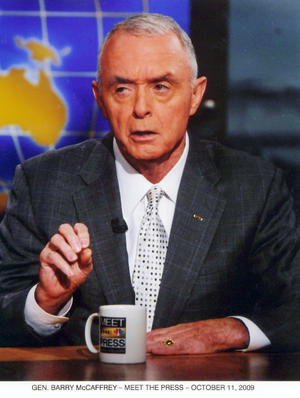At an event at George Washington University's Homeland Security Policy Institute last week Daniel Brito, of the Drug Policy Alliance, asked keynote speaker General Barry McCaffrey if there was complicity between the Mexican government and the Sinaloa Cartel—the Mexican drug trafficking organization led by the Joaquin “El Chapo” Guzman (famous for his inclusion in the Forbes 500 list). McCaffrey’s unclear answer to this question offered a glimpse into a powerful dynamic of this U.S.-supported drug war.
 Lately, there has been a lot of buzz around McCaffrey, who fluidly walks in upper military and official circles, and was the Drug Czar during the Clinton administration (1996-2001). In September we wrote here that he released a report commissioned by the Texas state government, authored with General Robert Scales, called “Texas Border Security: A Strategic Military Assessment.” The report claimed that organized crime syndicates from Mexico were following a “two-fold plan,” which was the equivalent of waging a “strategic-level” of war against the United States. Border counties, the report said, were becoming the ground-zero of the drug war as “narcotic transshipment points.” According to the state of Texas, the report offered proof that the U.S.-Mexico border was not “secure,” and contended that the United States needed to develop a counterinsurgency strategy to bolster the border enforcement apparatus. At the “Hybrid Threat: Crime, Terrorism and Insurgency in Mexico” forum, mentioned above, McCaffrey (at the 22:00 mark of the video), said that this would mean up to 45,000 Border Patrol agents, more than double the 21,000 that exist today.
Lately, there has been a lot of buzz around McCaffrey, who fluidly walks in upper military and official circles, and was the Drug Czar during the Clinton administration (1996-2001). In September we wrote here that he released a report commissioned by the Texas state government, authored with General Robert Scales, called “Texas Border Security: A Strategic Military Assessment.” The report claimed that organized crime syndicates from Mexico were following a “two-fold plan,” which was the equivalent of waging a “strategic-level” of war against the United States. Border counties, the report said, were becoming the ground-zero of the drug war as “narcotic transshipment points.” According to the state of Texas, the report offered proof that the U.S.-Mexico border was not “secure,” and contended that the United States needed to develop a counterinsurgency strategy to bolster the border enforcement apparatus. At the “Hybrid Threat: Crime, Terrorism and Insurgency in Mexico” forum, mentioned above, McCaffrey (at the 22:00 mark of the video), said that this would mean up to 45,000 Border Patrol agents, more than double the 21,000 that exist today.
At the 33:00 mark, Brito asked the question about complicity. McCaffrey responded with a drawn-out boiler plate response on drug consumption up to 37:15, the moment that he returned to the question at hand:
Now do I think the Mexican government is complicit with the Sinaloa Cartel? For God’s sake, these people are fighting for their lives. They’re being murdered. You know these men and women of law enforcement, the journalists are being murdered. This is a criminal element inside Mexico that needs to be confronted and we need to stand with them.
Brito broke in, and asked “Is that a yes or a no?” without a microphone.
McCaffrey responded by saying “Well, almost nothing in life works with a yes or a no.”
What McCaffrey said here is important. He does not explain further, but he could be acknowledging high-level U.S. knowledge about the collusion between drug cartels and the Mexican government, and that this is justified by circumstance (for example, siding with the Sinaloa Cartel in order to go after the Zetas). At the very least, he is saying that the drug war is much more complicated than the “good versus evil scenario” that U.S. officials so often peddle to the public. McCaffrey used this justification himself to insist that the U.S.-Mexico border be further militarized and that the United States up the ante from the roughly $1.5 billion given to Mexico under the counter-narcotic package known as the Merida Initiative. McCaffrey described this as a “meager” amount compared to the $10 billion the United States spends on the war in Afghanistan each month. But if he was saying there is "complicity" in Mexico, where was and where will all this money be going?
Officials often justify collusion with organized crime under the logic of making deals with the small guys to get to the bigger fish and ring leaders. This was the case with the Fast and Furious weapons-smuggling operation, and it is the case with the ever expanding army of U.S. informants in Mexico (as reported by The New York Times yesterday, and written about by NACLA blogger Fred Rosen). Many also say that the cooptation of officials, military, and police by organized crime is necessary for the lucrative $20-$35 billion-a-year illicit drug industry to flourish.
This collusion is both at home and abroad. On October 19, the day before McCaffrey’s statement, federal officials arrested an Immigration and Customs Enforcement (ICE) deportation officer in southern Arizona on charges of smuggling marijuana over the Mexican border. According to the Department of Homeland Security, between 2003 and 2010, 129 U.S. Customs officers and Border Patrol agents were arrested on similar corruption charges. Perhaps these statistics and McCaffrey’s comments only scratch the surface of what is really happening. And certainly put into question all calls for further border militarization.
For more from the Border Wars blog, visit nacla.org/blog/border-wars. And now you can follow it on twitter @NACLABorderWars. See also the May/June 2011 NACLA Report, Mexico's Drug Crisis; the Jan/Feb 2009 NACLA Report, Taking on Policy in the Obama Era; and the May/June 2007 NACLA Report, Of Migrants & Minutemen.
Subscribe to NACLA, Today!

